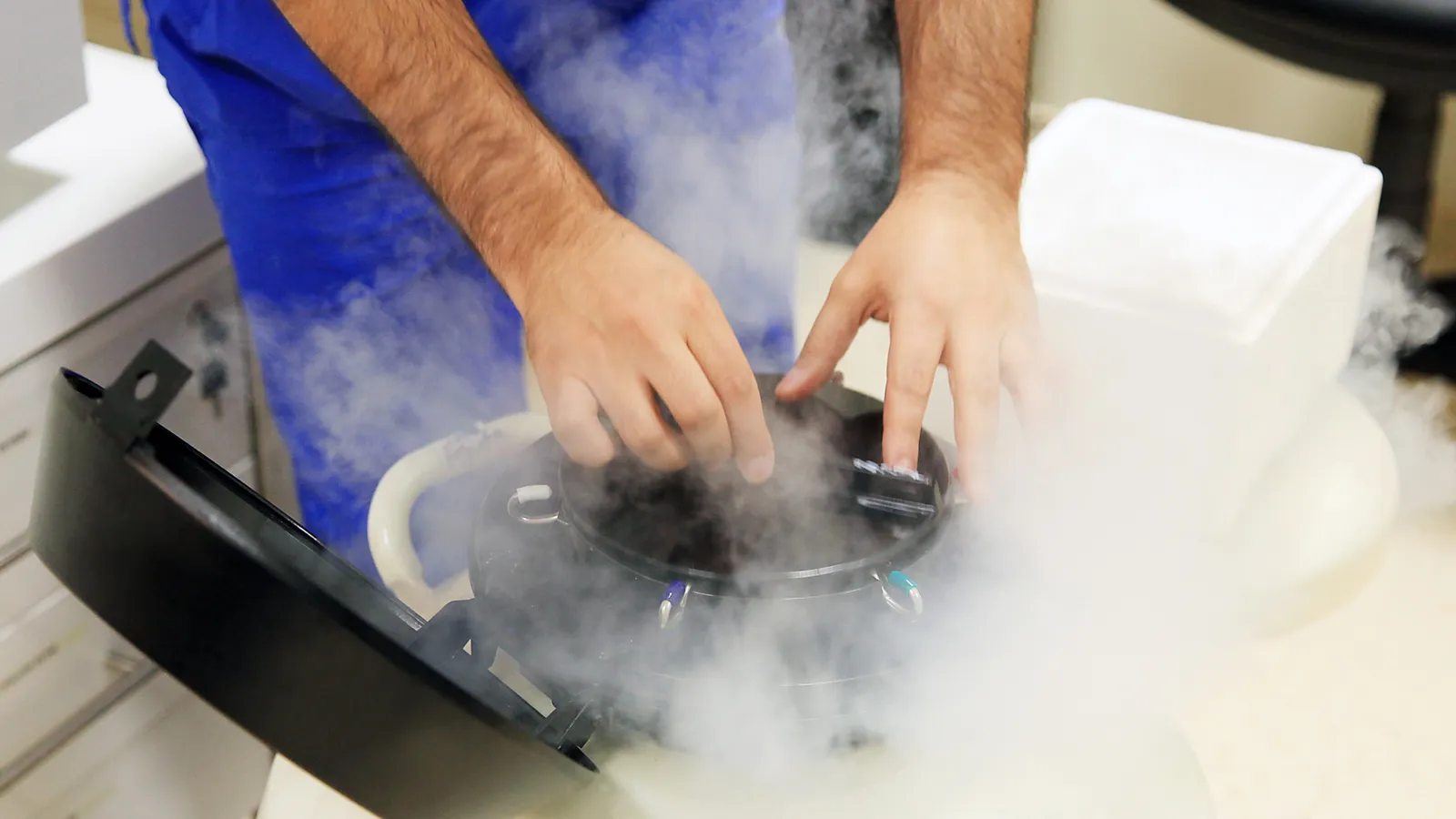The proactive fertility care industry is soaring. Is that a good thing?
Many women are seeking new services to plan their future parenthood. They can be empowering, but some argue there's a dark side to the growing business.

A few years ago, Elizabeth King, a fertility coach and counsellor based in Los Angeles, noticed a change in the clientele contacting her for help. Previously, King had mostly supported women going through infertility and pregnancy loss, but she increasingly found people were reaching out for information about their fertility, long before they began trying to conceive.
"Many of these clients come in with concerns about their age, medical history and often the anecdotal experiences, or information they've gathered from various media," says King. "The common thread among them is the desire for reassurance and control over their reproductive choices."
In response, an entire industry is growing to cater to these changing attitudes, offering fertility services to help women assess, understand, improve or prolong their fertility before trying to conceive. There's demand: data shows products and treatments such as egg freezing, fertility testing (often referred to as "fertility MOTs") and pre-conception consultations are growing in popularity, and even being offered as a workplace perk by some companies.
For firms that offer women these proactive fertility services, business is booming – and many people feel empowered by having new options to plan their futures. Yet alongside the benefits, experts caveat that some companies can sometimes provide questionable – even murky – guidance.
A growing industry with a growing demand
In almost all countries worldwide, the age women are having children has dramatically increased. Researchers suggest that in the Western world – where proactive fertility services are most common – economic uncertainty, limited housing availability and increased labour-market participation among women contribute to people delaying childbearing.
Experts say factors like these are propelling the rapid growth of the proactive fertility business, with the worldwide fertility-testing industry (which includes at-home and in-clinic testing) projected to be worth $680m (£540m) by 2025, up from $472m (£375m) in 2020. Egg freezing is currently the fastest growing fertility treatment.
"Between 2011 and 2021 there has been an 11-fold increase in egg-freezing cycles in the UK, and the number continues to rise," says UK-based Cristina Hickman, chief clinical officer at Fairtility, which designs AI tools to assist IVF clinicians.
Hickman, who is also the co-founder and chief operating officer at UK-based fertility clinic Ovom, says the increase in proactive fertility services is, in part, due to evolving technologies. She says it's only within the past 10 years that medical professionals have viewed egg freezing as an effective procedure (until 2012, the American Society of Reproductive Medicine classified the now widely used egg-freezing technique as "experimental").
As these processes have become increasingly mainstream, many women are finding more access to these technologies and, in some cases, feel more comfortable with embracing them as options.
'Falling short of delivering on promise'
For many, the rise of proactive fertility treatments means increased freedom around reproductive choices.
Individuals who don't feel ready or able to have a child, these services offer a way to make informed choices that may improve chances of future conception. For some, the benefits may be as simple as alleviating anxieties around fertility in a world where women's "biological clocks" are an oft-cited worry.
"Women who move forward with fertility MOTs or egg freezing have more of a sense of freedom in their future," says King. "They provide valuable information about reproductive health, which can guide personal and medical decisions."
King says these services have many benefits, but she also has concerns about their use. For some people, she believes, they can instil a false sense of security.
It takes two to make a baby, and half of patients needing fertility assistance suffer from male-factor infertility – Cristina Hickman
Although egg freezing is on the rise, the Human Fertilisation and Embryology Authority found in 2017 that of all the frozen eggs thawed in the UK since 2013, only around 15% of these were fertilised and transferred. Of those, only 13% resulted in pregnancy – a total of 22 pregnancies out of 1,204 thawed eggs. In the US, individual fertility clinics have reported more optimistic results, with one suggesting a 39% success rate per patient who undergoes thawing and implantation. Still, this figure suggests that fertility preservation remains a far from failsafe option. As the procedures become more widespread, emerging data will provide an even clearer picture of current outcomes.
Some experts also express concerns around fertility testing procedures. "Patients may have tested hormones, but not had an ultrasound, or vice versa, or haven't looked at the man's fertility, or haven't done carrier genetic screening," says Hickman.
For instance, although most proactive fertility care is targeted at and marketed towards women, it is estimated that around 40% to 50% of infertility cases are due to "male-factor infertility" – often caused by low sperm concentration or poor sperm mobility. This has led to fears that some proactive fertility companies are preying on heightened fears about infertility among women in their marketing.
"It takes two to make a baby, and half of patients needing fertility assistance suffer from male-factor infertility," says Hickman.
'Falling short'?
With numerous factors that could impact fertility, some experts believe that fertility testing – which usually only evaluates hormones and ovarian reserves – is being oversold. Recent research showed that many at-home ovarian-reserve testing companies "fall short of delivering on their promise", due to the limited factors that are measured, and a lack of reliability.
This means that people could make life-changing decisions about their reproductive health based on insufficient data.
Some experts also have concerns about the profit-driven nature of the proactive fertility industry. Kavelle Christie, the director of the Gender Equity and Health Justice Program at health-advocacy group Community Catalyst, argues that although some proactive fertility services such as at-home fertility testing can be relatively affordable, the cost of acting on any information is often hugely expensive.
Should I freeze my eggs?
"The fertility industry is a multibillion dollar one, and pre-emptive fertility treatments, unfortunately, like many other areas in healthcare, are often driven by profit instead of patient-centred care," she says. "The prohibitively high out-of-pocket costs associated with these services often prevent people from acting on any information or questions about their health, contributing to an accessibility gap."
The average cost of an egg-freezing cycle and thawing currently sits at around £7,000 to £8,000 in the UK, and $8,000 to $15,000 in the US. Doctors recommend numerous cycles of egg collection to improve chances of success, which may cost an additional £4,000 to £5,000 per time. Increasingly, this cost has driven workplaces to offer egg freezing as a workplace perk, with companies such as Apple and Facebook funding up to $20,000 worth of egg freezing.
This means that many proactive fertility services are the preserve of the wealthy or those employed by large and well-resourced corporations, and Christie says that low-income individuals and those living in rural communities where healthcare is hard to access are often excluded from the advances in fertility care that the industry.
'Not everyone who is marketed these services will need them'
For many women in their late 20s or early 30s, social media advertisements for fertility testing or egg freezing will be commonplace.
Research shows reproductive-age women are "overwhelming" targets of marketing for at-home fertility testing, and a recent survey of women who used period-tracking apps found that more than half had noticed an increase in baby- or fertility-related advertisements. For some women, experts worry the aggressive marketing of these services can lead to unnecessary worries about fertility, and an exaggerated sense of how likely women are to struggle to conceive.
"There is the potential for such services to feed into anxieties about fertility, especially when marketing plays on fears of declining fertility with age," says King. "Not everyone who is marketed these services will need them."
Flawed, but important
The proactive fertility industry is a relatively new but rapidly growing area of healthcare. As the sector continues to grow it's important, says Christie, that access to them is fair and affordable.
"These services are always worthwhile for people who want to understand better what's happening inside their bodies or start a family when and if they want," she says. "All people should have access to this kind of care and information to make personal decisions."
King adds although there are issues with the way that proactive fertility care is marketed, and concerns about encouraging women to delay motherhood without a full understanding of the risks involved, she would still encourage people who have concerns to explore their options.
"Being educated in your own body and what you are working with can only help in the long run," she says. "But while these services have important benefits and can offer peace of mind and a form of insurance for future fertility, it's crucial that they're provided with clear, balanced information without exploiting fears or insecurities."
-bbc







